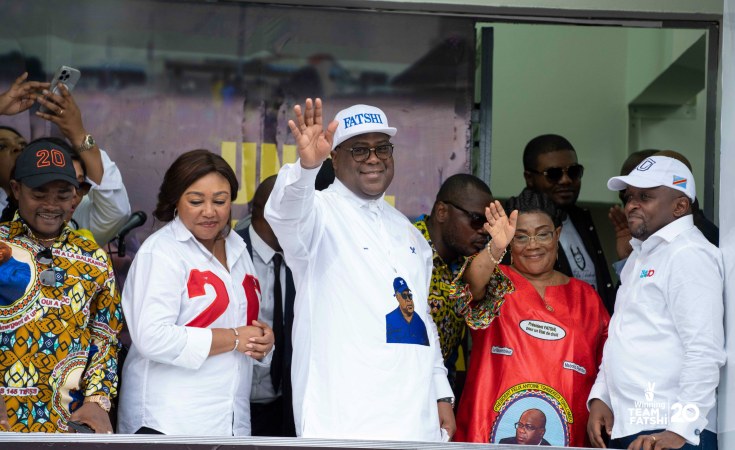DR Congo's President Felix Tshisekedi has won a second term in office with a landslide victory, according to provisional results announced on Sunday, in a vote opposition leaders have dismissed as a "sham".
Provisional results from the single-round presidential ballot, announced by the country's electoral commission Ceni, gave Tshisekedi more than 73 percent of the vote.
Opposition leader Moise Katumbi - a wealthy businessman and former provincial governor - was the runner-up with about 18 percent.
Martin Fayulu, who also ran in the last presidential election in 2018, came third with about 5 percent.
The 20 remaining candidates, including Denis Mukwege, who won a Nobel Peace Prize for his work with female victims of wartime sexual violence, were either around or under 1 percent.
The Democratic Republic of Congo's Constitutional Court is expected to confirm the provisional results on 10 January, with the president expected to be sworn in at the end of the month.
Speaking from his headquarters in the capital Kinshasa after the results were announced, Tshisekedi thanked his supporters for giving him another five-year term.
"You have embraced my vision of society," he said. "I will spare no effort for more jobs, more purchasing power, more access to basic services at all levels."
'Masquerade'
Tshisekedi, 60, first took office in January 2019 after another disputed election that many observers said he had lost.
Nine opposition candidates - including Mukwege, Fayulu and Katumbi - on Sunday signed a declaration rejecting what they termed a "sham" election and called for a re-run.
"We categorically reject the sham elections... and its results," the joint declaration said. It demanded fresh elections be held with a new electoral body on a date to be agreed by all.
"We call on our people to take to the streets en masse after the proclamation of the electoral fraud," they said.
Days earlier, Tshisekedi's government had already rejected calls for a re-run.
Addressing reporters in Kinshasa after the provisional results were announced, Fayulu called the results "a masquerade" and said they "must not be accepted".
Irregularities
Observers have raised concerns about "irregularities" in the vote.
Some 44 million people were registered to vote in the 20 December elections for president, as well as for national and regional lawmakers and municipal councillors.
In the end about 18 million people voted in the election, which had a turnout of more than 40 percent, according to the election commission.
Voting was officially extended by a day to account for problems, something local observers and civil society organisations have called illegal. Observers reported it continued for days afterwards in some remote areas,
One Christian observation mission said it "documented numerous cases of irregularities susceptible to have affected the integrity of the vote".
Fears of unrest
Several foreign embassies have called for "restraint" in DRC, where post-election tensions have been common.
Authorities say they have taken steps to prevent unrest, especially in the mining areas of the southeast that are Katumbi's stronghold.
They also stress that any electoral disputes must be presented to the Constitutional Court.
Candidates opposing the results have two days to submit their claims, and the court then has seven days to decide.
But opposition leaders say they have no confidence in the court or Ceni, which they argue is influenced by the government.
(with newswires)


